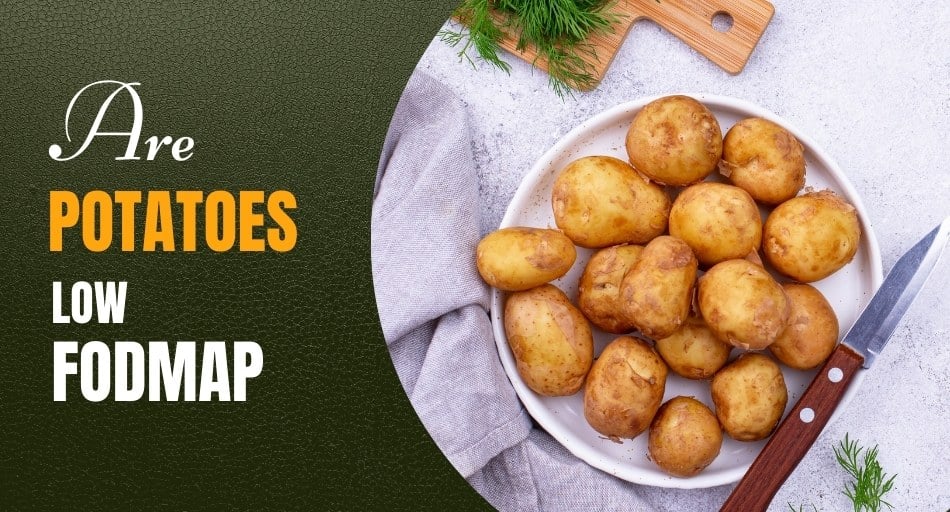Sticking to a low FODMAP diet can be challenging. Sometimes it might feel as if you have to completely remove your favorite foods from your diet to adhere to the dietary guidelines presented in this type of diet.

For example, many people love potatoes in all their forms, but they’re mostly carbs. This should be that they also contain FODMAPs, right? Well, that doesn’t have to be true.
So, are potatoes high in FODMAPs or allowed on a low FODMAP diet?
Table of Contents
Are potatoes low FODMAP?
Luckily for many people out there, potatoes are a low FODMAP food, as long as you stick to the recommended serving. If you eat just half a cup of cooked potatoes, you shouldn’t experience any negative symptoms afterward.
What’s more, potatoes are a great source of several important plant compounds as well as nutrients like potassium, vitamin D, vitamin B6, and manganese, among others.
So, adding this delicious, starchy vegetable to your diet can bring wonderful health benefits.

How low in FODMAPs are potatoes?
Potatoes do contain some FODMAPs, but they are rich in this type of carb. A serving of ½ medium-sized potato (or 75 g) is considered a safe amount for people on a low FODMAP diet.
In fact, potatoes are one of those foods that can be included in larger quantities on an IBS-friendly diet without any negative effects on your health.
What’s more, it’s best to prepare your potatoes with as few other ingredients as possible. The best way is to bake potatoes with their skin on, as most of the nutrients are found right underneath it.
On the other hand, boiling or frying potatoes can reduce the number of nutrients and add unnecessary calories from oil. This is also bad for your digestive system, especially if you struggle with IBS.
Are potatoes good for you?
Potatoes are rather a nutrient-dense veggie. A single serving of a medium baked potato contains 3.8 g of fiber, which is 15% of your daily recommended need for this nutrient.
The type of fiber found in potatoes is called resistant starch. This type of fiber isn’t fully absorbed and digested by your body, so it helps feed the ‘good’ gut bacteria in your stomach and intestines.

Resistant starch has also been shown to reduce insulin levels, improving your blood sugar levels.
Because of that, eating potatoes can help people with type 2 diabetes by removing excess sugar from their blood.
A single medium-sized potato also provides you with 28% of your daily need for vitamin C.
This micronutrient may help manage your blood pressure, lower your risk of heart disease, and prevent iron deficiency.
Vitamin C also boosts your immune system, making you less prone to viral infections like the common cold or the flu.
Potatoes are also a great source of potassium, a mineral that helps offset the negative effects of sodium on your blood pressure.
Because of that, getting enough potassium each day lowers your risk of high blood pressure, heart attacks, and strokes.
Additionally, potassium works as an electrolyte, which means that it helps regulate fluid balance, muscle contractions, and nerve signals.
As a result, it’s important to get enough of it as long as your dietary requirements allow it.
Eating potatoes can also help you reach your daily need for vitamin B6. This micronutrient may improve your mood and reduce the symptoms of depression.
Vitamin B6 also prevents and treats anemia by contributing to the production of hemoglobin.

Just like other veggies, potatoes are loaded with antioxidants. These plant compounds help flush free radicals out of your body, preventing oxidative damage to your cells.
Thanks to that, you’re less likely to develop various chronic conditions like diabetes, heart disease, and even cancer.
Can you eat potatoes on a low FODMAP diet?
Eating a moderate serving of potatoes on a low FODMAP diet is considered safe. To be on the safe side and avoid any digestive problems, make sure to stick to a half-cup serving of cooked potato.
This serving is low in FODMAPs and helps you load up on important nutrients and compounds found in potatoes.
On the other hand, make sure to stick to boiled or baked potatoes. These are the healthiest and don’t contain any unnecessary added calories from cooking oil or butter. Also, don’t serve potatoes with garlic or onions, as these two are high in FODMAPs.
Other than that, potatoes are healthy and safe for people with IBS and other digestive system issues.
What type of potato is best for people on a low FODMAP diet?
Experts recommend choosing starchy baking potatoes, red-colored potatoes, yellow-colored potatoes, and purple potatoes for those following a low FODMAP diet. They claim that these contain virtually no FODMAPs.
Because of that, eating them is very unlikely to trigger any IBS symptoms, provided you stick to the recommended serving.
Are sweet potatoes low in FODMAPs?

A standard serving of baked sweet potatoes with skin – which is around ½ cup (75 g) – is considered safe for a low FODMAP diet.
It’s important to follow this serving, as sweet potatoes contain some fructose, which is a type of FODMAP.
Luckily, it contains this type of carb in small amounts. So, if you stick to the serving mentioned above, you should be perfectly fine adding sweet potatoes to your diet.
What’s more, sweet potatoes are a great source of vitamin A, vitamin C, potassium, and manganese.
It also provides you with a decent dose of fiber, so you can reap a lot of health benefits by eating this type of potato.
Conclusion
Most types of potatoes are considered safe on a low FODMAP diet. They contain very small amounts of indigestible carbs, so they’re unlikely to cause any unpleasant symptoms, even in people with a particularly severe case of IBS.
What’s more, potatoes are an excellent source of powerful plant compounds as well nutrients that you might not be able to get from other food sources.
So, including moderate amounts of potatoes in your diet can do wonders for your health.
Sources: Nutrition Data, PMC, and National Library of Medicine
